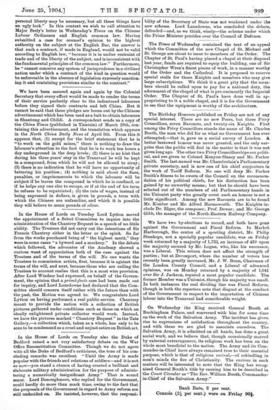In the House of Lords on Tuesday Lord Lytton moved
the appointment of a Select Committee to inquire into the administration of the Chantrey Bequest in a speech of no little ability. The Trustees did not carry out the intentions of Sir Francis Chantrey either in the letter or the spirit. So far from the works purchased being of " the highest merit," they were in some cases "a byword and a mockery." In the debate which followed, the advocates of the Academy showed a curious want of appreciation both of the case against the Trustees and of the terms of the will. No one wants the Trustees to commission artists, first, because it is against the terms of the will, and next, because those who are calling the Trustees to account realise that this is a most wise provision. After Lord Windsor had expressed, on behalf of the Govern- Ment, the opinion that a prinuilacie case had been made out for inquiry, and Lord Lansdowne had declared that the Com- znittee should concern itself rather with the future than with the past, the Motion was agreed to. We congratulate Lord Lytton on having performed a real public service. Chantrey meant to provide the nation with a collection of British pictures gathered under conditions such as those on which an ideally enlightened private collector would work. Instead, we have the pictures marked " Chantrey Bequest" in the Tate Gallery,—a collection which, taken as a whole, has only to be seen to be condemned as a cruel and unjust satire on British art.


























































 Previous page
Previous page